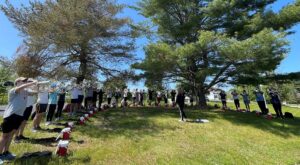Tagged Under:
It’s OK to be Bored
Recognize that the ordinary, routine and predictable days of the school year will lead to the finest moments in your teaching career.
As we near the halfway point of the school year, the day-to-day interactions with students can become a bit mundane, even tedious. We’re past the celebration of a fresh start and beyond the excitement of the initial sights and sounds of our seasons.
This is what I call “ordinary time” — the days when there’s nothing to do but show up and go to work. For both students and teachers, it’s OK to be bored. While we love the idea that every day will be one of growth, change, joy and triumph, in reality, many days are routine, uneventful, status quo, challenging and even a bit dull.
It’s up to us to recognize that some of our most routine, predictable days will lead to some of our finest moments in teaching. Consistency and predictability are key ingredients to growth. Repetition, repetition and more repetition are powerful tools for students to improve at their craft. Oftentimes, we are not teaching, rather, we are “supervisors of organized practice sessions.” These ordinary days, if put to their best use, will lead us and our students toward the most extraordinary results.

Everyone is a Champion on August 1
One of my favorite quotes that I learned early on in my teaching career was from Manny Maldonado, my colleague at Claudia Taylor Johnson High School in San Antonio, Texas. He would say to our band, “Everyone is a champion on August 1st. What are you going to be like on October 1st?”
His message was simple. August 1 is known as “Drill Day” in Texas. It marks the start of band camp for many groups and the first day of a new season. Manny’s point is that it’s easy to start strong when there’s excitement about a new year and lots of energy surrounding dreams and goals for the season. However, when the mid-season slump rolls around, how many students will still have the same excitement about finishing strong during those later “laps of the race”?
While teaching The Cadets, we talked to the members often about the difference between interest and commitment. We explained that commitment meant following through long after the initial interest and joy subsided. We see the same issues with abandoned New Year’s resolutions, fitness goals or the challenge of pursuing any new habit. We see it on Christmas and Easter at church when the pews are full, but on June 1 or September 1 during “ordinary time,” church attendance is thinner. In our world of band or drum corps, the challenge of pushing through the day-to-day can be daunting.

Finding Joy in Consistency
We see pictures on social media of people who look joyful in their classrooms and attend in-service sessions in hopes of finding motivation and rejuvenation. When I’m in the middle of the grind, I wonder, “Am I the only one who isn’t enjoying this right now? I’m bored, grumpy and over it.”
Cue another of my mentors, Joe Dixon, who wisely preached, “Children need to learn to be bored.” Learning to work through boredom is a powerful skillset for young musicians in their quest to become excellent at their craft. I often must remind myself, “I need to get better at being bored.”
Of course, music isn’t boring. It’s our passion — that’s why we teach and share our gifts. I go back to “ordinary time” and think about how these often boring, typical days are the ones that can lead us to extraordinary results … if we use them correctly. How often have we reached the end of a season and wished we had used time differently? Or, after the final contest, we promised ourselves, “Next year, I am going to be sure to …”
Here’s the best part about the moment we are in — it’s not too late to be the best version of ourselves. And it starts with accepting that it’s okay to be bored sometimes.

You Don’t Have to Do the Same Thing to Do the Same Thing
We’ve all told our students that “consistency is key” to achieve the desired result. But here’s the thing: You don’t have to do the same thing to do the same thing. Take daily drills — as a euphonium player or brass instructor, I think a daily diet of breathing, a long tone, a lip slur and a tonguing drill are really important for musicians. Long tones to develop sonority and endurance, lip slurs to build flexibility and range, and a tonguing drill to work articulation. Of course, air is our fuel — how many of us really practice breathing every day in our individual practice? Or with our bands? We know we should, but that’s easier said than done.
The truth is you don’t have to practice the same Remington the same way every day to practice Remington. You can change up the key, the starting note, the length of each note, the speed of the exercise, or even the articulation. You don’t have to do the same slur every day to practice lip slurs, and you don’t have to practice the same tonguing drill the same way every day to practice tonguing. Of course, if you have the patience and discipline to do it the same things every day and train your students to work through the monotony, then you have mastered a special level of discipline.
Play different chorales instead of perfecting the same one. It’s OK to mix up the process or the routine as long as you’re still covering the basis. Your fundamentals are your foundation, and they need daily attention. Don’t give up on them because you’re bored or pressured to work on music or drills.

Develop Discipline
Consistency and predictability are key for continued growth. Repetition, repetition and more repetition can be powerful tools for students to improve their skillset. Often, we are not teaching in the traditional sense. Rather, we are supervisors of “organized practice sessions,” to borrow a term from Gino Cipriani, the Assistant Director of the Boston Crusaders.
Teachers who spend class time, rehearsals or sectionals turning on a metronome and practicing for students over days and weeks may find that students learn how to practice correctly through that process. Often, the best work gets done with fewer words and more reps, slow and then fast.
Think about your own individual practicing on your instrument, of an etude, a jury piece, a solo or any technical excerpt — it’s hard work. And it’s solitary work that may not involve many words or motivational speeches, just a lot of grinding it out. As coaches, we should consider practicing etudes or band music with our students. Pace their practice. Help them learn how to break things down. And then do it over and over again — day after day. Doing so may give students a chance to develop the discipline to do the things that must be done when they need to be done.

Delayed Gratification
Progress in band is incremental. Growing up in a cranberry farmer family, I’m prone to agricultural references. The most obvious is if we think of a cornfield, we don’t see corn grow 6 feet high in a week. It starts with clearing the field, planting the seed, careful maintenance and patience. Over time, we see the tiny sprout grow into mature corn that is eventually ready for harvest.
Too often, crop failure occurs when we miss a step in the process — not enough water or fertilizer or extreme temperatures. In other words, if you neglect the basics or the temperature is too hot or cold in your band hall — your “crop” is toast.
Your students won’t necessarily notice their increase in range, flexibility or speed of technique in a single day or week. Still, they will see incremental gains with patience, going slowly and repeating the process repeatedly. As a coach, I patiently guide them through their boredom and frustration to achieve the desired results. I often think about delayed gratification and the idea of teaching students to “rest” when they are tired, rather than quit.

Ordinary Days Can Lead to Extraordinary Results
On my first day of spring training with the Boston Crusaders this year, I vividly remember thinking:
- “Finals is so long from now.”
- “I wonder when we will be good?”
- “How am I going to get through the next week of doing the same thing every day?”
- “How will the students get through 12 weeks of it?”
All normal thoughts at the beginning of a long journey. Of course, summer went by in the blink of an eye, and on finals night, watching the corps was its usual emotionally charged experience filled with smiles, some tears and many celebratory hugs. The day after finals, as I sat on my flight home, I reflected on the many hours during our spring training, breaking down the same technique and warmups day after day, feeling like we would never get away from the monotony.
The longer I have taught, the more I have learned to find joy in those dull, long days that have become a key ingredient in our success. While I don’t always look forward to them, the knowledge of what’s to come reminds me that those ordinary days can lead us toward the most extraordinary results when put to their best use.















